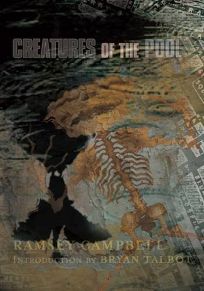 By RAMSEY CAMPBELL (PS Publishing; 2009)
By RAMSEY CAMPBELL (PS Publishing; 2009)
Of the thirty-some novels by Ramsey Campbell, this is only the second to be written in the first person. The first was 2007’s masterful GRIN OF THE DARK, which I feel is one of Campbell’s best-ever works. The two books have similar aims, but the comparison does CREATURES OF THE POOL no favors, as its narrator isn’t as interesting as the guy in GRIN (whose idiosyncratic point of view actually extended to the chapter headings—“I’m Not A Loser,” etc.) and the narrative considerably less compelling.
The first-person point of view is that of the jittery Gavin Meadows. He gives guided tours of the titular “Pool,” specifically Liverpool, which ultimately plays a more important role in this odd tale than Gavin himself. Gavin, like Liverpool native Ramsey Campbell, knows the locale inside and out, and his knowledge extends to the legends and folklore of the area—which, as he gradually discovers, may not be entirely legendary.
But then again Gavin could well be losing his mind, judging from the spectral forms he always thinks he’s seeing (“Does it send a mouse fleeing into the wall,” Gavin wonders upon opening a door, “or just a trick of light and shadow?”) and the ceaseless water imagery that pervades his reality. Everything Gavin views appears to be dripping and/or waterlogged, and the wetness comes to take on an increasingly sinister aspect, intimating something dredged up from watery depths.
Nobody does this sort of hallucinatory inversion of the ordinary like Ramsey Campbell, and the constant reality displacement is unnerving—particularly since, this being a first-person account, we have no way of objectively gauging how reliable Gavin’s viewpoint is. Obviously his paranoia, suspicion and employment hassles aren’t enough to sustain a novel, whose main thrust is provided by the disappearance of Gavin’s eccentric father. Even this development, however, is open to interpretation: is the old guy truly lost/kidnapped or is this another of Gavin’s delusions—or are they delusions?
This is the most Dan Brownish of Campbell’s novels, with hints of a vast conspiracy and a cliffhanger at the end of every chapter (usually pertaining to Gavin’s father, who’s always phoning or texting). So the book is readable, at least. There’s also a strong and disquieting climax set in an underground network of tunnels, in which the explanation—or an explanation—for the weirdness is finally offered.
